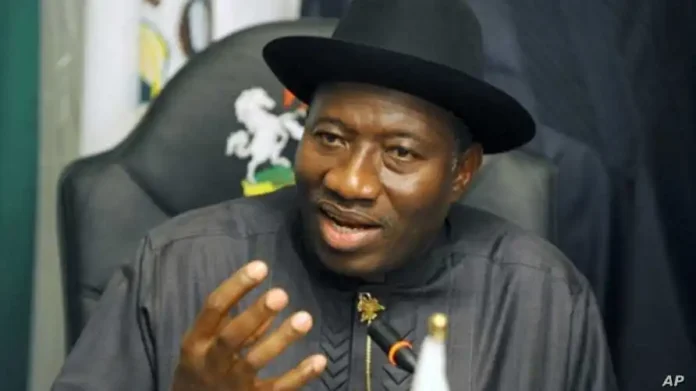News Investigators/ Former President Goodluck Jonathan says his membership of the West African Elders Forum (WAEF) is one of the reasons for his continued absence in active and partisan politics in recent times.
Jonathan gave this explanation in Abuja, while speaking at an event marking the 10th anniversary of the Goodluck Jonathan Foundation (GJF), with the theme “Legacy of Impact, Celebrating Our Journey.’’
The News Agency of Nigeria (NAN) reports that the event was also with a gala dinner held to mark the 68th birthday anniversary of the former president.
Jonathan, on why he hasn’t been involved in active politics, said that WAEF membership comes with a strict condition of non-partisanship.
He said that the forum was a preventive diplomacy initiative made up of former heads of state who visit countries within the sub-region during election periods to mediate and prevent crises resulting from poorly managed elections.
“The idea is yes, we observe the elections, but we are not co-observers.
“We go there to make sure that if we notice anything that is coming up negatively; we intervene and try to see what we could do so that those issues will not snowball into full crisis.
“The condition to be a member of the WAEF is that you must be a former president within the sub-region and a former president of ECOWAS.
“One clear condition is that you will no longer be an active politician and that is why I am disappointing most of my political associates.
“They expect me to play active role in politics, but before I play active role in politics, I will first and foremost resign from the WAEF,” Jonathan said.
Speaking on the state of the nation, Jonathan decried the situation in politics, charging politicians to conduct themselves with decorum and a sense of responsibility.
He said that unlike other professions such as teaching, which require training and certification, individuals often enter politics and assume leadership positions without basic training.
“We must change the face of politics. We must see politics as a business of responsible individuals,” he said.
The former president also condemned the recent kidnapping of about 25 girls in Kebbi, noting that the incident reminded him of the abduction of the Chibok girls during his tenure.
He offered condolences to the families of those who lost their lives, including a vice principal, and called for prayers for the speedy rescue of the abductees and an end to such situations in the country.
Recounting the origins of his foundation after losing the 2015 general election, Jonathan disclosed that it was businessman Tony Elumelu who suggested the idea.
He noted that while he initially considered broad areas like education and poverty alleviation, the advisers prevailed that he focus on areas where he had established global credibility.
According to him, advisers suggested focusing on democracy because he strengthened the electoral commission and conceded defeat even before the 2015 elections were concluded, a feat celebrated globally.
Jonathan added that in spite his academic and professional background in environmental protection and coming from the Niger Delta, he decided to concentrate the Foundation’s efforts on democracy and governance.
In her remarks, the Executive Director, GJF, Ms Ann Iyonu, described the event as a moment of reflection on a decade of dedication to and inclusive democratic governance, peace building, development across Africa.
Iyonu said that since inception, the foundation had remained committed to advancing the values of democracy, equity and progress through strategic initiatives and collaborative partnerships.
She noted that 10 years later, GJF stood proud to say that “together they have turned bold ideas into transformative action”.
Iyonu said that the foundation had strengthened democratic institutions through election mediation missions, participation in observation missions, policy dialogues and strategic advocacy across the continent.
She added that the forum’s annual democracy dialogue inaugurated in 2021 had grown into a vital platform for reflection, engagement and strategic action.
This, according to the executive director, had brought together voices from across the African continent to interrogate the state of our democracy and chart pathways toward its renewal.
“In Accra this year, we gathered under the theme “Why Democracies Die’’, a timely and necessary inquiry into the structural and systemic factors undermining democratic resilience both within Africa and globally.
“Through our advanced peace building efforts, convening stakeholders in conflict-prone regions, we have fostered peaceful political transitions in various countries in the region and further promoted inclusive governance as a pathway to lasting peace.
“We are promoting the security of African states and their citizens within the context of the rule of law, fundamental human rights and democratic principles via research, learning and knowledge exchange.
“We have also contributed to preventing violent extremism both online and offline at policy and community level, led initiatives aimed to improve trust and collaboration between State institutions and citizens, in advancing peace and security.
“We have expanded our global footprints, forging partnerships with international organisations and amplifying African voices on the world stage.
NAN


